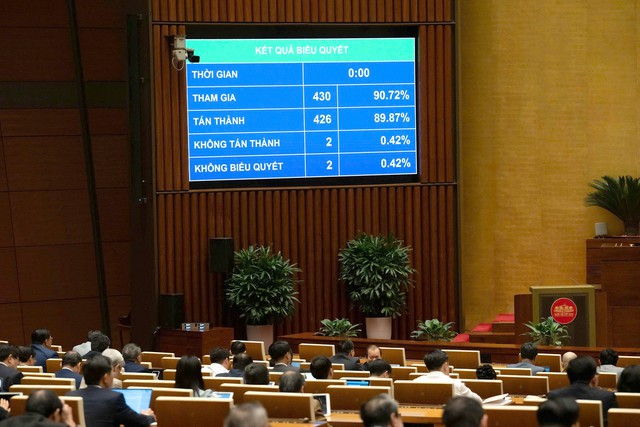Four laws on judicial affairs passed
VGP - The 15th National Assembly (NA) passed four draft bills including the Law on Extradition, the Law on the Transfer of Persons Serving Prison Sentences, the Law on Mutual Judicial Assistance in Civil Matters, and the Law on Mutual Judicial Assistance in Criminal Matters on November 26 in Ha Noi.

* With 426 out of 430 deputies voting in favor (89.87 percent), the National Assembly passed the Law on Extradition, comprising four chapters and 45 articles. The law sets out the principles, authority, conditions, and procedures for extradition between Viet Nam and other countries, as well as the responsibilities of Vietnamese state agencies.
It stipulates that extradition shall be carried out based on the following principles: respect for independence, sovereignty, territorial integrity, and non-interference in each other’s internal affairs; equality and mutual benefit; and compliance with the Constitution and laws of Viet Nam, as well as treaties to which the Socialist Republic of Viet Nam is a party. In cases where Viet Nam and the foreign country are not both parties to an extradition treaty, extradition shall be conducted on the basis of reciprocity, provided it does not contravene Vietnamese law and is consistent with international law and practice.
Under the law, persons subject to extradition include individuals who have committed offences for which both Vietnamese law and the law of the requesting country prescribe a penalty of at least one year’s imprisonment, life imprisonment, or the death penalty, or individuals who have been sentenced by a court of the requesting country to a prison term with at least six months of the sentence remaining to be served.
If the requesting country seeks extradition for a person involved in multiple criminal acts—each constituting an offence under both Vietnamese law and the foreign country’s law—and at least one of these acts satisfies the conditions set out in Clause 1 of this Article, Viet Nam may agree to extradite that person. Where Viet Nam is the requesting country, the Ministry of Public Security shall request the competent authority of the foreign country to agree to extradition in similar circumstances.
*The Law on the Transfer of Persons Serving Prison Sentences was adopted with 429 out of 430 votes (90.51 percent). Consisting of four chapters and 48 articles, it defines the principles, authority, conditions, and procedures for transferring prisoners between Viet Nam and other countries, together with the duties of relevant Vietnamese agencies.
This Law is applicable to Vietnamese agencies, organizations, and individuals, as well as foreign agencies, organizations, and individuals involved in the transfer of persons serving prison sentences between Viet Nam and other countries.
The Law designates the Ministry of Public Security as the Central Authority of the Socialist Republic of Viet Nam for the transfer of persons serving prison sentences.
The Central Authority of the Socialist Republic of Viet Nam for the transfer of persons serving prison sentences is the focal point for the exchange of information and documents related to the transfer of persons serving prison sentences; preparing, sending, and receiving requests for such transfers; leading and coordinating with ministries, sectors, and localities in reviewing and handling transfer requests; monitoring and urging the implementation of transfers; and performing other duties and powers in accordance with the law on the transfer of persons serving prison sentences and relevant treaties to which the Socialist Republic of Viet Nam is a party.
* Also receiving 429 out of 430 votes (90.51 percent), the Law on Mutual Judicial Assistance in Civil Matters includes four chapters and 38 articles. It details the principles, authority, and procedures for providing mutual legal assistance in civil matters, and specifies the responsibilities of Vietnamese authorities.
* With support from 426 out of 427 deputies casting ballots (89.87 percent), the National Assembly adopted the Law on Mutual Judicial Assistance in Criminal Matters.
Comprising four chapters and 42 articles, it outlines the principles, authority, and procedures for cooperation in criminal matters between Viet Nam and other countries, and the related responsibilities of Vietnamese agencies.
Mutual legal assistance in criminal matters must uphold the principles of independence, sovereignty, territorial integrity, non-interference in internal affairs, equality, and mutual benefit.
It must comply with the Vietnamese Constitution and laws and relevant treaties, or—where no treaty exists—be based on reciprocity in accordance with Vietnamese law and international law and practice.
All four laws will take effect on July 1, 2026./.

